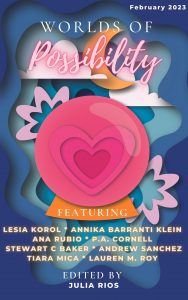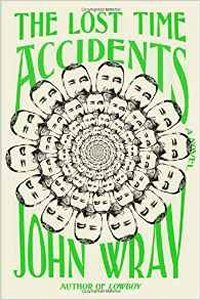Charles Payseur Reviews Short Fiction: Cast of Wonders, Worlds of Possibility, Samovar, and Strange Horizons
 Cast of Wonders 2/25/23, 2/28/23
Cast of Wonders 2/25/23, 2/28/23
Worlds of Possibility 2/23
Samovar 2/27/23
Strange Horizons 2/20/23, 3/6/23, 3/13/23
Cast of Wonders, which I mentioned last month, fit a few more stories into February, including a rather charming one about a ‘‘malfunctioning’’ AI in Marie Vibbert’s ‘‘Haunting the Docks’’. To the artificial docking manager, though, it’s more accurate to say they’re just a bit enthusiastic about their work, and perhaps a little bored. So when a couple of humans show up to investigate the derelict docking bay, they find an… overzealous greeting waiting for them. Vibbert does a good job managing the slow reveal that the narrator isn’t exactly reliable, despite expectations around how professional AI normally act. It’s a lot of fun!
At Worlds of Possibility, February brought five new stories and a poem. The poem, ‘‘Purple/Magenta’’ by Tiara Mica, finds a young narrator caught in a moment of sweet intimacy with someone else – something that their parents will not approve of. But there is a lack of concern, a daring that carries through, that concludes, whatever else comes from this in punishment, it’s worth it. Mica packs the piece with a rich sensuousness and, especially with the work’s ending, provides a provocative and wonderful experience. Among the fiction, Lauren M. Roy provides an interesting twist on multiversal transportation in ‘‘The Last Amanda’’. The titular Amanda was the girlfriend of a man who devised a way to travel between universes, and who left a trail of breadcrumbs for her to follow to unlock the great mysteries of the cosmos. Except that Amanda really isn’t that interested, especially after she starts getting pestered by alternate versions of said dead boyfriend who want to know how her Shaun managed to unlock travel between dimensions. Roy is careful not to lean too hard into the humor of the situation, complicating Amanda’s feelings for her dead lover without making him a one-dimensional egotist. But it is a funny piece, sharp and piercing when it needs to be, and it comes together nicely.
The multilingual Samovar had its first issue of the year in February, and ‘‘A Short Biography of a Conscious Chair’’ by Renan Bernardo is a delight. As probably fitting for a story about a conscious chair, the piece is laid back and slow, following the observations of a narrator who was accidentally graced with thought but not a voice. Their maker dies and they are sold, and sold again, but along the way something unexpected happens – the chair becomes a part of a family. The emotional work that Bernardo does in the story is impressive, highlighting the pain of missed connections, guilt, regret, and most of all silence. Silence, which dominates so much of the narrator’s life, ultimately doesn’t stop them from being a part of something warm and vibrant and loving.
At Strange Horizons, February closed with the haunting ‘‘Turing Test’’ by Fiona Lu, a poem that centers an AI narrator, an android who is looking for meaning and connection, and who is also looking forward to the next life. The piece reads almost as a prayer, the narrator beseeching a father for explanation, for a promise of something better, but it seems an admonishment as well, a reminder of missed chances, of prejudice and fear and exploitation. Lu plays with format and language, confronting readers with snippets that form together into something lovely and alive but which, when taken separately from the slashes in the text, splinter and dissolve in their meaning, leaving readers to pick up the pieces and reconstruct the voice of the narrator.
Moving into March, Yume Kitasei’s ‘‘The Gratitude of Mice’’ is a weird but compelling story about two sisters living together, neither of them very satisfied with the situation but both trying to make the best of it. At least, until they learn that mice have been burying presents for their neighbor because she is kind to them and gives the mice small treats. And so the younger sister, a guest in her older sister’s home, begins to try and win the mice to her side so they can grant her wish, as well. Kitasei doesn’t shy away from the strange or grotesque, showing just how the desire to exploit kindness as a kind of genie in a bottle backfires (rather horrifically). It’s dreamlike and striking, grounded by the older sister’s quiet resentment, and it makes for a memorable read. Moving back to poetry, Jace DeAngelo keeps this rather grim with ‘‘Wide-Shining Craters’’, which reveals a future where homeless test subjects are launched into space with as much hope of return as the famous first dog in space. For the narrator of the poem, though, dying obediently for the ‘‘betterment’’ of science is not the real plan. And while their rebellion against the system cannot change the fact that they’re marooned in space, there is a kind of opportunity as well, to do something unexpected and empowering. DeAngelo carries on from the long history of science acting dangerously and unethically towards those deemed expendable, taking some agency back for those written into history as passive martyrs for progress.
Recommended Stories:
‘‘A Short Biography of a Conscious Chair’’, Renan Bernardo (Samovar 2/23)
Charles Payseur is an avid reader, writer, and reviewer of speculative fiction. His works have appeared in The Best American Science Fiction and Fantasy, Lightspeed Magazine, and Beneath Ceaseless Skies, among others, and many are included in his debut collection, The Burning Day and Other Strange Stories (Lethe Press 2021). He is the series editor of We’re Here: The Best Queer Speculative Fiction (Neon Hemlock Press) and a multiple-time Hugo and Ignyte Award finalist for his work at Quick Sip Reviews. When not drunkenly discussing Goosebumps, X-Men comic books, and his cats on his Patreon (/quicksipreviews) and Twitter (@ClowderofTwo), he can probably found raising a beer with his husband, Matt, in their home in Eau Claire, Wisconsin.
This review and more like it in the May 2023 issue of Locus.
 While you are here, please take a moment to support Locus with a one-time or recurring donation. We rely on reader donations to keep the magazine and site going, and would like to keep the site paywall free, but WE NEED YOUR FINANCIAL SUPPORT to continue quality coverage of the science fiction and fantasy field.
While you are here, please take a moment to support Locus with a one-time or recurring donation. We rely on reader donations to keep the magazine and site going, and would like to keep the site paywall free, but WE NEED YOUR FINANCIAL SUPPORT to continue quality coverage of the science fiction and fantasy field.
©Locus Magazine. Copyrighted material may not be republished without permission of LSFF.






